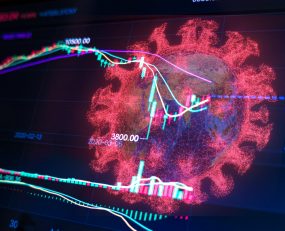
It is still far from clear what form the global recovery from the Covid pandemic will take. Whilst many sectors are bouncing back well, debt levels are spiralling and this has prompted a warning from one of the world’s leading economists, Nouriel Roubini. Many of his concerns centre around supply chain issues.
In an interview with business media company, Bloomberg, he said that the world’s economy was in a far weaker position to deal with the present financial crisis than it was following the ‘great recession’ of 2008 due to massive – and still growing – levels of public and private debt. He suggested that central bankers are looking towards higher levels of inflation to wipe out debt as opposed to a cut in government spending. Eventually with deficits so high, real interest rates would have to increase, resulting in a greater level of debt default.
Whilst this may start to happen in the next few months, he identified a number of negative supply chain shocks which would take effect in the medium term.
Firstly, he warned about the threat of deglobalisation and protectionism. He said this could result in the ‘balkanization’ (fragmentation) of supply chains which would have impacts on costs and efficiency. One aspect of this is the on-going US-China trade war which over the past few years has distorted global trade flows. He believes that there will be a further decoupling of the US from China especially in terms of data and technology.
Roubini also said that he expected further variants of the Covid virus to continue to disrupt supply chains. In China, Vietnam and other locations throughout Asia, production has been halted at various times over the past 18 months, leading to increased costs and the reduction in output. The effects have not only been felt in manufacturing but also at ports and airports which have resulted in backlogs. The perceived need for more self-reliance which this will create as countries seek to bolster national industrial strategies will mean the greater likelihood of export controls of key goods, consolidating the trend towards protectionism mentioned above.
Climate change will also play a role. Weather events in recent years have become more extreme and unpredictable, impacting upon agricultural output and food supply chains. This has resulted in the increased volatility in food prices. Indirectly, energy policies adopted by governments to mitigate carbon emissions are leading to higher gas and oil prices which are then passed onto transportation companies and, of course, consumers.
Another risk identified by Roubini is the vulnerability of supply chains to cyber attack, a threat posed by criminal or state actors. We don’t have to look too far to find examples of this issue in the logistics industry – shipping lines and express parcels providers have fallen victim to instances of so-called ‘ransomware’ costing the industry billions of dollars. In the future, the risk will only escalate as corporations become almost totally reliant on technology.
He also expected that in the future there would be rising wealth inequality. Parts of this inequality would be driven by automation and AI which would benefit corporations and other owners of capital, rather than employees. Government response would be to strengthen the power of labour organizations and workers which will increase wage pressures (c.f. the ‘gig’ economy). Unlike other costs, those related to labour tend to ratchet up in one direction rather than rise and fall. This would have a significant impact on structural inflation.
In summary, Roubini believes that there is a considerable risk of a high inflation, low growth economic environment. Central bankers, he says, are caught in a ‘debt trap’ where any attempt to take steps to tighten monetary policy will result in markets crashing. He believes that growth levels over the next few years will be lower whilst production and supply chain costs will be high resulting in 1970s style ‘stagflation’, a reverse of many of the trends of the last decade.
Of course, there is no guarantee that this scenario will play out. Central banks may have success in managing the transition to a post-Covid economy and supply chains may not fragment in the way that Roubini believes likely. There may be no ‘hard landing’. After all, many consumers are sitting on large amounts of savings, confidence amongst the business community in many parts of the world is high and inflationary pressures may be transitory. New technologies, working practices and e-commerce may move economies into a new paradigm. However, Roubini’s warning indicates that not everyone is convinced that traditional relationships between debt, growth and inflation have been somehow replaced by a ‘new normal’. If he is right, the world’s economy – and supply chain industry – may be in for a rough few years.
Source: Transport Intelligence, September 23, 2021
Author: John Manners-Bell